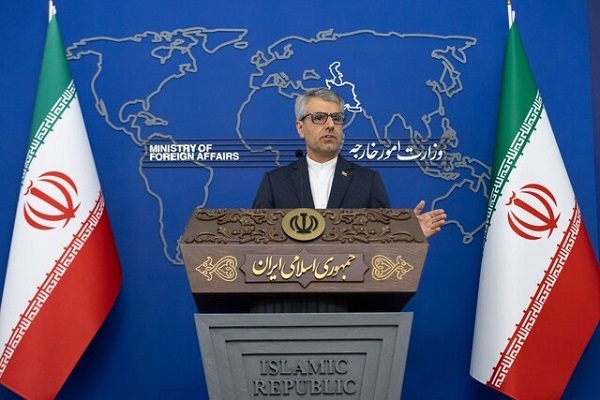
TABNAK, Jan 03: Iranian Foreign Ministry Spokesman Esmaeil Baghaei called for Afghanistan's cooperation to keep natural flow of waters in rivers bordering the two countries.
Baghaei referred to the long-standing identity, cultural, racial, religious and civilizational ties between the two nations of Iran and Afghanistan and the presence of millions of Afghan citizens in Iran for nearly five decades, stressing that maintaining and deepening relations between the two countries in various fields requires respect for mutual interests and avoiding harmful unilateral actions.
He also stressed natural rights of Iranians in southern provinces of using shared rivers.
“Afghanistan is expected to cooperate in keeping flow of water from border rivers starting from Afghanistan and continue to flow in Iran and to remove the obstacles that have been created.”
“Islamic Republic of Iran has repeatedly mentioned to Afghan parties, through appropriate means, especially through official diplomatic channels and functional (technical) mechanisms, that the use of water resources and basins cannot made without respecting Iran's rights in accordance with bilateral treaties or applicable customary principles and rules, as well as the important principle of good neighborliness, as well as environmental considerations.
A decade after the unilateral control and capture of water resources of Harirud through the Salma dam, Afghanistan’s rulers have built a second barrier on the river, further disrupting the flow of water to Iran and Turkmenistan.
For millennia, the rivers that formed in the mountains of central Afghanistan – once a part of Iran - have sustained life in its western territories. In an otherwise arid region, the control of water has been a point of tension since the modern borders were established in the mid-nineteenth century.
The Harirud Basin is an international water basin shared between Afghanistan, Iran, and Turkmenistan, which has crucially contributed to the livelihood of many people.
When in 2016, Afghanistan officially opened the Salma dam on the upper reaches of the Harirud River, it was said that the dam would cut down the water flow of the river to Iran and Turkmenistan by 73%.
Some 3.4 million Iranians in the northeast rely on the Harirud river basin for water. This includes the population of Mashhad which depends on water pumped 182 km from the Doosti dam jointly built by Iran and Turkmenistan.
Now, the ruling Taliban in Afghanistan say they have started filling the new Pashdan dam built on Harirud near Herat, drawing strong reaction from Iranian authorities for ignoring the country’s customary rights.
The group’s ministry of energy and water says the effort does not end with Salma and Pashdan, and the construction of two other dams on Harirud is also on the agenda.
The 1,124 km-long Harirud River flows from the Koh-i-Baba Mountains to Herat where it turns northwards to reach Iran, forming approximately 160 km of the political border between the two countries.
In Iran, it joins the Kashafrud River, shaping around 170 km of the border between Iran and Turkmenistan before draining into the Karakum desert in Turkmenistan.
Iran is already locked in a dispute with Afghanistan over its share of water from the Helmand River. The river runs through much of Afghanistan from its source in the mountains north of Kabul, feeding Iran’s Sistan wetlands in the border regions of the two countries.
Many experts believe that Afghanistan’s rulers are using dams as leverage for pressure on neighbors and care less about water diplomacy. They treat water as a political tool to regulate their foreign policy with neighbors.
In fact, water is their only geopolitical advantage which they think they should use as a bargaining chip to set out their conditions. The general thinking is that past Afghan governments have not properly exploited this perceived geological heft which has made the country vulnerable and weak.
From their perspective, the best way to gain power or balance their power against the regional countries is to use water resources as a weapon. Hence, the construction of dams, canals and tunnels is not a merely economic exigency.
Iran’s water security concerns, instead, are legitimate and deserve serious consideration. A productive start toward an optimal regional solution and development of equitable water management regulated by legal cooperation agreements is a must.
Therefore, it is necessary to resolve the dispute by focusing on treaties, international legal rules and procedures that emphasize and clarify the right of countries to shared rivers.